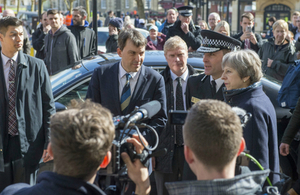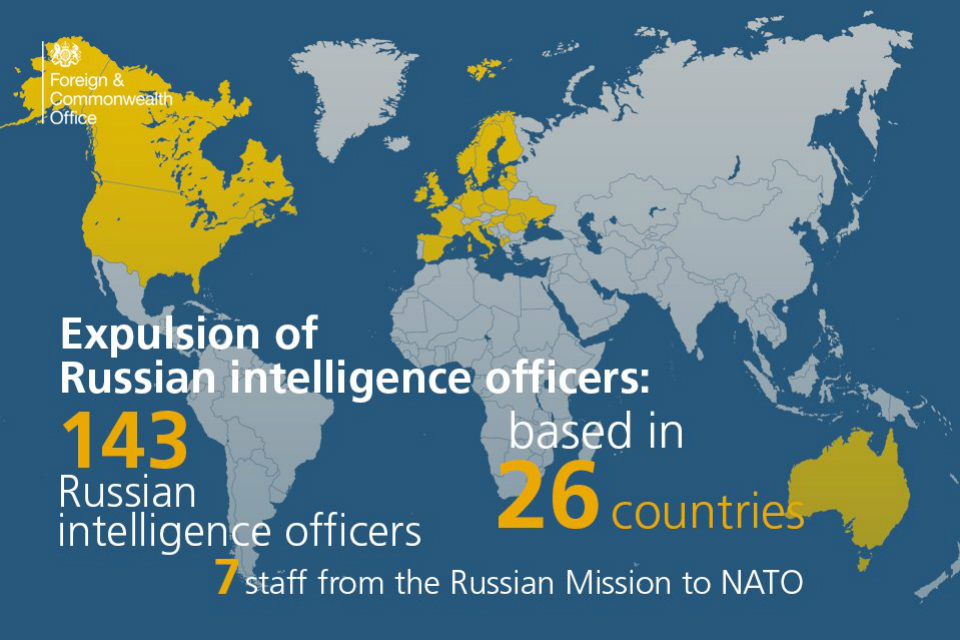Novichok nerve agent use in Salisbury: UK government response, March to April 2018
This page sets out the government's initial response to the Salisbury attack, where a military-grade nerve agent was deployed in the UK on 4 March 2018.

Prime Minister Theresa May visiting Salisbury, pictured with police officers and a crowd of people.
On Sunday 4 March Sergei and Yulia Skripal were poisoned in Salisbury with a military-grade nerve agent of a type developed by Russia. This page sets out the government’s actions in response to the attack during March and April 2018.
G7 foreign ministers’ statement
On 17 April the G7 foreign ministers issued a statement condemning the nerve agent attack and agreeing with the UK’s assessment that it is highly likely that the Russian Federation was responsible.
Letter to NATO
On 13 April UK National Security Adviser Sir Mark Sedwill sent a letter to Jens Stoltenberg NATO Secretary General setting out further information on how Russia has the technical means, operational experience and the motive for the Salisbury attack. The UK Ambassador to Russia gave a briefing to the international diplomatic community.
OPCW report
On 12 April the Organisation for the Prohibition of Chemical Weapons (OPCW) published their report. It confirmed the UK findings: the toxic chemical used in the attempted assassination of Sergei and Yulia Skripal was a military grade nerve agent – a Novichok.
The Foreign Secretary gave a statement on the OPCW report and the Head of UK Delegation updated the Organization for Security and Co-operation in Europe.
On 18 April Peter Wilson, UK Permanent Representative to the OPCW gave a statement to the Executive Council and on 19 April the UK Permanent Representative to the United Nations gave a statement to the UN Security Council.
Read the Foreign Secretary’s statement.
UN Security Council and OPCW meetings
On 5 April the UK Permanent Representative to the United Nations, Karen Pierce, gave a statement at the UN Security Council emergency meeting called by Russia. Writing in the Sunday Times on 8 April, the Foreign Secretary said that only Russia could have committed this crime.
At the request of Russia, the Organisation for the Prohibition of Chemical Weapons (OPCW) Executive Council met on 4 April. The Acting UK Permanent Representative to the OPCW responded on the UK’s actions, in line with the Chemical Weapons Convention. Following the defeat of Russia’s proposals, the Foreign Secretary gave a statement.
Prime Minister’s 26 March statement on collective diplomatic expulsions
Speaking in the House of Commons, the Prime Minister said that 18 countries have announced their intention to expel more than 100 Russian intelligence officers. This includes 15 EU member states as well as the US, Canada and the Ukraine, and is the largest collective expulsion of Russian intelligence officers in history. Find out more in the Prime Minister’s Commons statement on national security and Russia.
The Prime Minister also spoke about this in her Commons statement on the March European Council.
On 27 March the Foreign Secretary wrote in The Times that our allies will expel Russian officials because they share our view of the threat post by the Kremlin to their values and security.

Map showing the 26 countries that have expelled 143 Russian intelligence officers and 7 from the Russian mission to NATO
View our Twitter Moment about our allies and partners expelling Russian intelligence officers.
In his 28 March Mansion House speech, the Foreign Secretary thanked the 27 countries and NATO for expelling Russian officials whose presence they deem to be no longer conducive to the public good.
Russian disinformation: 6 points
The Russian government’s response has demonstrated disdain for the gravity of the Salisbury attack.
Prime Minister’s 14 March statement: immediate actions including diplomatic expulsions
In her statement to Parliament on 14 March the Prime Minister said that Russia provided no explanation as to how this agent came to be used in the UK. There is no alternative conclusion other than that the Russian State was culpable for the attempted murder of Sergei and Yulia Skripal, which was an unlawful use of force by the Russian State against the UK. The UK government would:
- expel 23 Russian diplomats identified as undeclared intelligence officers
- propose new legislative powers to harden defences against Hostile State Activity and ensure those seeking to carry out such activity cannot enter the UK
- suspend all planned high-level contacts between the UK and Russia
On 17 March the Foreign & Commonwealth Office issued a statement in response to the Russian government’s decision to expel UK diplomats, following the British Ambassador’s meeting with the Russian government.
On 22 March British Ambassador to Russia, Laurie Bristow, gave a briefing to the international diplomatic community
Russian State disinformation
Writing for the Telegraph on 20 March, the Foreign Secretary looks at the Russian State’s disruptive behaviour in Russian elections and the Salisbury attack.
Russia’s impact on global security
Foreign Secretary Boris Johnson wrote an article in the Washington Post setting out Russia’s threat to global security.
The Kremlin has positioned Russia in direct opposition to the West
Prime Minister’s 12 March statement: seeking explanation from Russia
On 12 March Prime Minister Theresa May gave a statement in Parliament. Either this was a direct act by the Russian State against our country, or the Russian government lost control of this potentially catastrophically damaging nerve agent and allowed it to get into the hands of others. The Foreign Secretary spoke to the BBC and reiterated the Prime Minister’s message.
Russian state aggression in the past few years
Pattern of Russian state aggression
Home Secretary’s initial statement
On 8 March the Home Secretary Amber Rudd gave an initial statement on the investigation into events in Salisbury. This followed Foreign Secretary Boris Johnson’s response to an Urgent Question in Parliament on 6 March.
International response
World leaders
On 22 March the Prime Minister met with President Macron and Chancellor Merkel where the 3 leaders agreed on the importance of sending a strong European message in response to Russia’s actions. The European Council also issued a press release on its conclusions about the Salisbury attack
On 15 March the leaders of France, Germany, the US and the UK have issued a joint statement on the Salisbury attack.
The Prime Minister has spoken with world leaders about the ongoing investigation. Each expressed their solidarity with the UK:
- call with Japanese Prime Minister Abe on 20 March
- call with Polish Prime Minister Morawiecki on 18 March
- call with Italian Prime Minister Gentiloni on 16 March
- call with Australian Prime Minister Turnbull on 16 March
- call with French President Macron on 15 March and on 12 March
- call with Canadian Prime Minister Trudeau on 14 March
- call with Prime Minister Xavier Bettel of Luxembourg on 14 March
- call with US President Trump on 13 March
- call with German Chancellor Merkel on 13 March
On 13 March the Foreign Secretary also called for a united response with our international counterparts. Find out more about the international response in our 14 March Twitter Moment.
European Foreign Ministers express their solidarity
The Foreign Secretary spoke to the media before the Foreign Affairs Council on 19 March and the Foreign Affairs Council issued a statement.
Foreign Ministers express solidarity
On 21 March UK National Security Advisor Sir Mark Sedwill gave a statement on his meeting with the EU High Representative, senior EU officials and representatives of member states.
Organisation for the Prohibition of Chemical Weapons
Peter Wilson, UK Permanent Representative gave an update to the Organisation for the Prohibition of Chemical Weapons (OPCW). This follows his statement to the OPCW on 13 March.
Independent technical experts from the Organisation for the Prohibition of Chemical Weapons (OPCW) arrive in the UK on 19 March to begin their investigation into the nerve agent used in the attempted assassinations in Salisbury.
Independent OPCW investigation
NATO
The Foreign Secretary and NATO Secretary General Jens Stoltenberg held a joint press conference on 19 March.
On 15 March National Security Advisor Sir Mark Sedwill briefed the NATO North Atlantic Council
Other international organisations
The Foreign & Commonwealth Office also raised this issue in other international forums:
- Head of UK Delegation Sian MacLeod gave a statement to the Organization for Security and Co-operation in Europe on 15 March
- Ambassador Jonathan Allen gave a briefing to the United Nations Security Council on 14 March
- in the 37th Human Rights Council session Julian Braithwaite, the UK Permanent Representative, gave a statement to the United Nations in Geneva on 14 March
Related government announcements
On 17 April the Department for Environment, Food and Rural Affairs gave an update on decontamination work in Salisbury.
On 27 March the government announced £2.5 million to support businesses, boost tourism and meet unexpected costs in Salisbury due to the exceptional response and recovery effort.
On 15 March Defence Secretary Gavin Williamson announced a £48 million investment in a new Chemical Weapons Defence Centre to maintain our cutting-edge in chemical analysis and defence.
Advice and guidance
- latest Foreign & Commonwealth Office travel advice for Russia
- Public Health England advice for people in Salisbury
Updates to this page
-
Statement to the OPCW Executive Council added
-
G7 foreign ministers' statement added
-
Letter from the UK National Security Adviser to the NATO Secretary General added.
-
Foreign Secretary's comments on the OPCW report added.
-
UK Permanent Representative to the UN's statement at the UN Security Council added.
-
Added statements on the 4 April OPCW meeting.
-
Foreign Secretary's Mansion House speech added
-
Foreign Secretary's Times article added
-
Prime Minister's Commons statement on the European Council added
-
Prime Minister's meeting with President Macron and Chancellor Merkel added
-
British Ambassador to Russia's briefing to the diplomatic community added
-
Sir Mark Sedwill's latest statement added
-
Prime Minister's call with the Japanese Prime Minister added
-
National Security Adviser's statement added
-
Foreign Secretary's Telegraph article added
-
Foreign Secretary's Foreign Affairs Council remarks and PM call with Polish Prime Minister added.
-
Call with Italian Prime Minister added.
-
Added the Prime Minister's latest call.
-
Statement to the Organization for Security and Co-operation in Europe added
-
Foreign Secretary's Washington Post article added
-
Joint statement from France, Germany, US and UK added
-
Added UN Security Council statement and the Prime Minister's latest calls
-
New statement to the Organisation for the Prohibition of Chemical Weapons added
-
First published.